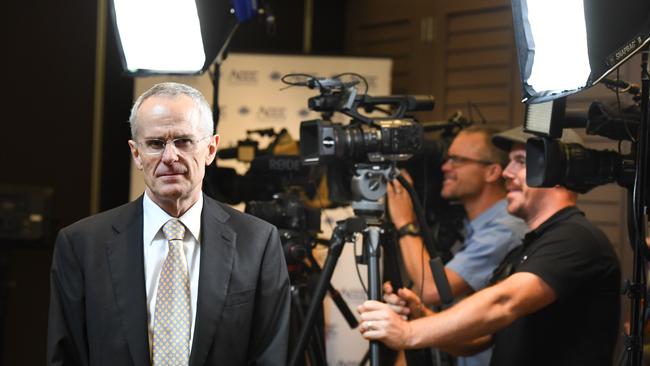Competition watchdog takes the fight to Facebook, Google
It may not look like it but Google and Facebook got off lightly this week.

It may not look like it but Google and Facebook got off lightly this week. Competition tsar Rod Sims merely wants a new federal regulator to crawl all over their innermost secrets, change the way they do business and tame their market power. What’s not to like about that?
It might mean a heavily regulated future but that still would be preferable to a forced corporate breakup — and that option was on the table. Google and Facebook just may have dodged a bullet.
The breakup option was being considered after an inquiry that triggered five investigations into possible breaches of Australian competition and consumer law.
Those investigations are still running. They come soon after Google’s unlawful conduct in Europe. In July it was fined €4.3 billion ($6.9bn) for continually breaching antitrust law since 2011. A year earlier it was fined €2.4bn for a separate breach of antitrust law.
But Sims, chairman of the Australian Competition & Consumer Commission, seems to have concluded that there is a more effective way of dealing with these companies than breaking them up. “We thought about all options,” he told a press conference on Monday, “but we didn’t see much utility in breakups.”
Instead, he has something in mind that is just as ambitious.
Officially, this week’s move was merely the launch of a preliminary report on digital platforms. But if Sims has his way, history may see this as a first step in a co-ordinated international crackdown on the tech companies that have done immense damage to journalism. He explained his thinking: “What we will be doing with these recommendations is we will be engaging with our international counterparts as well because, to some extent, some of these recommendations stand alone but some of them could be even more powerful if we were to engage with our international counterparts.
“We know that many governments and international competition and consumer regulators are looking at these issues. I think it is a fertile ground in which we can plant some seeds here.”
The ACCC’s plan would be built around a regulator that looks like a beefed-up version of the algorithm review board that had been suggested in April by News Corp Australia (publisher of The Weekend Australian).
Algorithms determine the positioning of advertising on Facebook pages and the ranking of news reports in Google search results. Yet nobody, apart from those at the tech giants, has any idea about the settings that determine the sort of news they present and the effectiveness of their advertising. The idea, firmly resisted by Google, had been to analyse and remedy “algorithmic distortions of competition”. Google objected that public disclosure of how its algorithms work might lead to “gaming” of search results by advertisers and websites.
To address that, the ACCC proposes that such information should not be made public. But it still wants the regulator to be equipped with the power to extract information and documents and report on whether the tech giants are engaging in anti-competitive conduct.
The consistent theme running through the 374-page report from this inquiry is the need for greater transparency to ensure the market power enjoyed by the tech giants is not misused.
Google and Facebook dominate online advertising. But their advertisers cannot determine for themselves whether they have reached the target audience.
Their lack of transparency did little to dissuade the ACCC from concluding that they have the incentive and the opportunity to misuse their power. The ACCC has taken an interest in this for two reasons: it considers journalism to be a public good from which everyone benefits, and it believes the market power of the digital platforms is having a profound impact on news and advertising.
In the 10 years to 2016, census data shows the number of Australians in journalism-related occupations declined by 9 per cent and by 26 per cent for print journalists.
Concerns about Google in particular stem from what the ACCC says is that organisation’s intention — and ability — to position its search engine between consumers and producers of news and to become the source for information.
“The ubiquity of the Google and Facebook platforms, and the lack of transparency in the operation of their algorithms, have had adverse effects on news publishers and the opportunities to monetise their content,” the report says.
A study by the University of Canberra has found more than half the nation’s online news consumption passes through platforms such as search engines, social media and news aggregators. This same study suggests that the influence of algorithm-driven platforms is more dominant with the young. Social media is the main source of news for 36 per cent of those aged between 18 and 24, the study found.




To join the conversation, please log in. Don't have an account? Register
Join the conversation, you are commenting as Logout